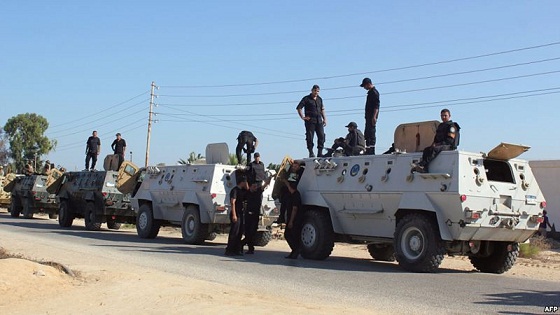The Association for Freedom of Thought and Expression (AFTE) criticised in a Sunday briefing the arrest of four employees of a leading NGO whilst conducting field research in the town of Khosous two days earlier.
AFTE commented on the incident saying that the arrests illustrate the reality hundreds of humanities and social science researchers face on a daily basis in conducting field research in designated areas.
The four employees were arrested on accusations of working without appropriate accreditation. They were conducting a research visit to the Zaraiyeb area in Khosous to “study the urban area and produce a participatory study for developing the region”. Their visit was in preparation for a presentation to official bodies working on developing slum districts, according to the rights group. They were released on bail one day later.
Director of the Central Agency for Public Mobilisation and Statistics (CAPMAS), Abu Bakr Al-Guindy, told Daily News Egypt that the agency is a regulator that organises the process by which research is conducted.
“Legally, the agency must give permission for researchers to conduct field research,” Al-Guindy explained. “Whoever wants to conduct field research needs to provide a request to the agency as well as the police station located in the designated area. That is mainly done to protect both the researcher and the citizen involved in the research.”
In the briefing, AFTE reviewed some of the “legal obstacles” in the way of producing and disseminating information, previously published in a 2012 report regarding CAPMAS’ role.
CAPMAS is Egypt’s official statistical agency responsible for the collection and dissemination of data and the production of statistics, reports and the periodic census. The law grants the agency sole authority over the production and dissemination of information, requiring any public or private entity or individuals to publish only information gathered by CAPMAS. In addition, any type of information or statistics not covered by the programmes under CAPMAS cannot be published without its consent.
“This means that CAPMAS is monopolising the process of processing and collecting data, whereby no entity can collect data that falls within the framework of the CAPMAS programmes, and data that falls outside that framework needs to be approved by the agency,” according to the briefing.
AFTE criticised CAPMAS’ alleged monopoly which leaves no room for other entities and agencies to review data and information produced by CAPMAS or provide alternative data.
Al-Guindy explained the agency requires prior permission for conducting any research to ensure efficiency, and to avoid repetition of the same research topics. There is also the issue of the type of questions asked by the researcher and ensuring their compliance with the society in question, to avoid the occurrence of problems with the subjects.
The briefing was concluded by a number of recommendations, including: the need to review legislation related to the production and dissemination of information; breaking CAPMAS’s monopoly; and introducing a mechanism of coordination among all parties involved in the system of information gathering and production.
“The whole system of the production and dissemination of information is very organised, and coordinated among all parties involved,” commented Al-Guindy. “This is something that is already in place.”
Freedom of scientific research is guaranteed by Article 66 of the Egyptian constitution, which stipulates that freedom of scientific research is guaranteed. It adds that the state is committed to sponsor researchers and inventors and to provide protection for them in endeavouring to apply their innovations.


